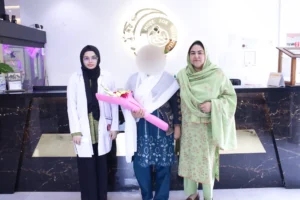Have you booked a consultation with an IVF specialist in Lahore? Well, congratulations on taking a big move in your fertility journey. Stepping into a fertility specialist’s clinic after all that you’ve gone through (several months of trying only to get negative pregnancy results, countless Google searches, and many home remedies) is not easy.
It’s completely normal to get lost in the medical jargon and forget the actual questions that you wanted to ask. To prepare you for the first consultation with a specialist, we’ve compiled a list of the most common questions to ask a gynecologist when trying to get pregnant. Before we get into the details, let’s see why it matters.
Why It’s Important to Ask the Right Questions Before IVF
IVF is much more than a medical procedure. It’s a sensitive and emotional journey for couples who couldn’t get pregnant after trying home remedies, non-invasive medical treatment, and consultations.
The first step of preparation is creating a list of questions to ask fertility doctors on your first visit.
Here’s why it’s important:
- They paint a clear picture of the IVF success
- They help you know the reasons for not getting pregnant
- They help you decide whether to proceed with IVF or choose an alternative route
- They help you set a realistic expectation
These are not all. Knowing the process beforehand allows you enough time to prepare physically, mentally, emotionally, and financially for the journey.
Key Questions to Ask Your IVF Doctor in Lahore
Here are some common questions to ask at an IVF clinic:
What Is the Likely Cause of Infertility in My Case?
Infertility has many causes. While some remain unexplained, others are linked to problems with the fallopian tubes, uterus, man’s sperm count or quality, etc. Knowing the cause of infertility is the first step in figuring out the appropriate treatment.
Here’s what it clarifies:
- If the problem is in your uterus or your partner’s sperm.
- If it’s due to advanced maternal age or a medical issue, such as PCOS, endometriosis, or uterine anomalies.
- Whether IVF is the best treatment plan for your case.
Your fertility specialist will start with a detailed overview of your medical history and ask if you have tried any fertility treatment before. They may also order tests, like blood tests, hormone tests, and ultrasounds, to figure out the underlying cause of infertility in women. A semen analysis may be needed if your doctor suspects male-factor infertility.
What IVF Techniques Are Best for Me?
Of a lengthy series of steps involved in IVF, some are optional, and others are needed in certain cases. For example, PGT is optional. ICSI may be needed in case of severe male-factor infertility. Here’s more on the additional procedures.
- ICSI: In cases of male-factor infertility, an embryologist might conduct ICSI, a procedure that manually injects a single, live sperm into the female’s egg to boost the chances of fertilization.
- PGT: If you have a history of multiple miscarriages or you carry genetic diseases, you may want to discuss PGT to ensure the transfer of a healthy embryo.
- Frozen Embryo Transfer: If you are at an increased risk of Ovarian Hyperstimulation Syndrome (OHSS), your doctor will postpone embryo transfer until your body is prepared for implantation. During this time, the embryos will be frozen.
What is the Success Rate of IVF in Your Clinic?
No fertility clinic can guarantee a 100% success rate for its fertility procedure. However, the right fertility doctor will always be transparent about the numbers. Ask about the clinic’s success rate, whether your age or reproductive health affects it, and what your overall chances of conceiving through IVF are. This will help you set realistic expectations.
What Are the Risks and Side Effects of IVF?
Advancements in technology have made IVF a safer and effective procedure, but there are still a few risks you should be aware of before proceeding. Ask your fertility specialist about what you’ll go through during the procedure and after embryo transfer.
They will explain the side effects, such as bloating, mild cramps, headaches, mood swings, and more. They will also explain serious yet rare risks, like OHSS. These are not meant to scare you, but keep you informed, so that if anything goes wrong, you seek immediate medical attention.
What Are the IVF Costs, and What Is Included in the Package?
The next question is the cost. Ask about the price breakdown. Remember, the treatment can get expensive, especially if you need optional procedures, like PGT. When discussing price, ask what’s included in the package and what will cost extra. For instance, does the package include medications and consultations? What about embryo transfer or freezing? Knowing the cost in advance will help you prepare financially. It also avoids surprise bills.
How Will My Treatment Plan Be Customized?
Every couple has a unique IVF journey, so it’s obvious that your doctor will customize your treatment plan based on your age, infertility cause, and other factors. Ask about how the doctor will personalize the procedure for you.
What Are My Options if IVF Fails?
While it can be disheartening to ask this question, it’s important to think practically and be ready for whatever happens after embryo transfer. Remember, a failed IVF doesn’t mean there’s no option left.
You can still conceive through other procedures, such as IUI, or with subsequent IVF cycles. Based on your medical history and the reason for IVF failure, your fertility specialist may recommend waiting until you are ready (both physically and emotionally) for the next cycle.
What Lifestyle Changes Should I Make to Improve Success?
The success of IVF also depends on your lifestyle, dietary choices, and other activities outside the fertility clinic. Ask your doctor what lifestyle modifications can help improve IVF success. They will most likely share an ideal diet plan, exercise routine, and other lifestyle changes.
Understanding IVF in Lahore
Lahore has become a leading destination for fertility treatment in Pakistan. The city has some highly recognized, ISO-certified IVF centers, which are staffed with top-rated and highly experienced doctors.
Some clinics, specifically Australian Concept, offer a high success rate in helping thousands of patients (15,000+) in conceiving through Assisted Reproductive Technology (ART). Although the exact success rate of the treatment can vary, fertility clinics in Lahore offer treatments that match international standards.
The benefits go beyond the technical and medical expertise. In Lahore’s fertility centers, you can expect fertility treatments that follow Islamic rulings and adhere strictly to Shari’ah.
Expert Advice: What Makes a Good IVF Doctor in Lahore
Your experience during the IVF procedure—from the diagnosis to the embryo transfer—will depend largely on your fertility specialist. Since you will be communicating with them throughout your journey, it’s important to select a doctor who’s qualified to handle your individual case while offering emotional support throughout your journey. If you are unsure about what to look for, check these:
- Experience: Doctors who graduated from recognized medical colleges and have experience in different types of fertility cases are your best picks. Look for the experience they hold, specializations, qualifications, and certifications.
- Good Communication: IVF can be stressful for parents. Having a professional guide you through every step of the journey, while clearing all your doubts (no matter how insignificant they sound), is important.
- Transparency: Your fertility doctor must clearly explain the cost associated with IVF, additional costs if you need ICSI or other procedures, and the cost of things not included in the package, such as hospital stay or embryo freezing.
- Use State-of-the-art Technology: Your chances of success increase drastically when the fertility clinic is equipped with cutting-edge technology and the doctor knows how to use it.
When choosing an IVF clinic in Lahore, go through the center’s official website and check key credentials like ISO certification and doctors’ qualifications. Also, go over the patients’ testimonials and reviews to make an informed choice.
Preparing Emotionally and Mentally for IVF Treatment
Almost every couple that chooses IVF has done all that they could to get pregnant. From signs of infertility in men to the reasons for not getting pregnant, you may have Googled everything that could possibly be the culprit behind your infertility.
After trying everything, you may have opted for IVF. It’s normal to feel overwhelmed, stressed, and anxious before, during, and after the procedure. You never know whether it will work in your favor. In fact, many couples who conceive through IVF report stress, mood swings, and other mental issues that last until delivery.
If you, too, experience these symptoms, know that you are not alone.
We’ve listed a few tips that can help.
- Practice Meditation: Stress is the biggest issue that couples undergoing IVF experience. To keep it at bay, practice meditation, mindfulness, gratitude, journaling, and yoga.
- Share Your Feelings: Talk to your partner, a friend, or a counsellor about your mental health. Share your feelings and fears.
- Be Practical: Ask your fertility specialist about the success rate of IVF and set expectations accordingly.
- Seek Support: Your fertility specialist may refer you to a psychologist, a counsellor, or a professional who can offer emotional support during your treatment.
Conclusion
IVF can be confusing for couples who have no clue about the treatment, the number of procedures, and what actually happens during each visit. The only reliable way to know what the process involves and what you should expect is by asking the fertility specialist. They will be able to explain everything, including minute details, about IVF, its cost, timeline, your options, and success rate, so you can be aware of what to expect during ovulation induction, retrieval, fertilization, embryo transfer, and afterward.
FAQs
What happens after an IVF consultation?
Your fertility specialist will start ovulation induction if you are a good candidate for it.
What tests need to be done before IVF?
Most couples need semen analysis, blood tests, hormone tests, and ultrasounds.
What questions should I ask before IVF?
Ask your doctor about the success rate of IVF, cost breakdown, how to improve chances of conception through IVF, risks and side effects, etc.
What are the chances of IVF being successful?
It depends on your individual case. Maternal age, your medical history, the health of your uterus, and your partner’s sperm quality are a few factors that might affect IVF’s success.
How to prepare for a fertility consultation?
List all the questions to ask a gynecologist when trying to get pregnant, and ask everything that crosses your mind. The more questions you ask, the better you will be prepared for the procedure.






